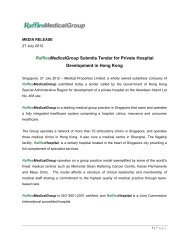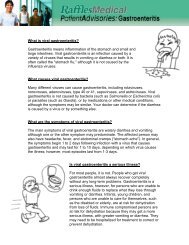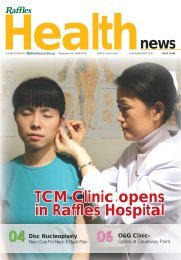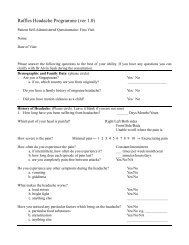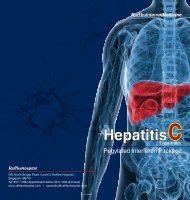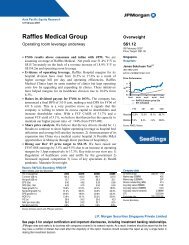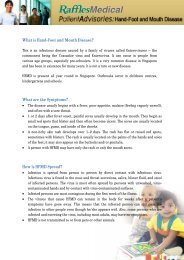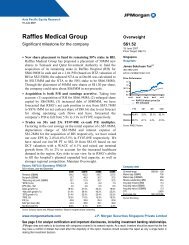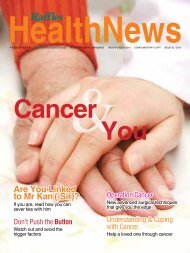REGISTRATION No. 198901967K MICA (P) - Raffles Medical Group
REGISTRATION No. 198901967K MICA (P) - Raffles Medical Group
REGISTRATION No. 198901967K MICA (P) - Raffles Medical Group
You also want an ePaper? Increase the reach of your titles
YUMPU automatically turns print PDFs into web optimized ePapers that Google loves.
<strong>Raffles</strong> HealthNews Q&A 29<br />
Upon arrival at a foreign destination with a bad back, what should I<br />
do Stretch in the hotel room Get a deep-tissue massage Swim Or<br />
undergo physiotherapy What should I not do<br />
Before setting out, you should do exercises that strengthen your shoulders, back, stomach and legs, not<br />
forgetting to stretch hamstrings as well. Do likewise when you reach the destination. Ask for a firm mattress<br />
when you arrive at the hotel. It may be a good idea to have a nice relaxing massage as well. Swimming is<br />
also a good exercise as it helps to stretch and relax tired muscles.<br />
At the hotel and when physiotherapy is not available, if the back pain is acute and feels like a stab, ice the<br />
affected area for not more than 20 minutes at a time. If you feel tired, have stiff and tight muscles, treat it<br />
with heat for 30 to 40 minutes. Do not place your suitcase on the bed to unpack, get the hotel staff to place<br />
them on the luggage rack instead. Always remember not to bend forward to pick up your bags or suitcase.<br />
Dr David Wong, Specialist in Orthopaedic Surgery, <strong>Raffles</strong> Orthopaedic Centre<br />
I’d like to take a holiday while pregnant. Can you share<br />
some health advice Should I limit the flight time<br />
Are there things I should bring along<br />
It is usually safe to travel during pregnancy if the pregnancy is uncomplicated. The best time to take<br />
a holiday would probably be in the second trimester. This is because the pregnancy is supposedly<br />
"more stable", and many of the symptoms of early pregnancy such as nausea and vomiting would<br />
have abated.<br />
Pregnant women are more prone to developing deep vein thrombosis ("economy class syndrome")<br />
where blood clots in the legs veins. If it dislodges and enter the lung circulation, it can be a potentially<br />
life-threatening condition. Drinking more water and exercising the legs will reduces the risk. In highrisk<br />
cases, e.g. obesity, long flight, it is advisable to have special Thrombo Embolic Deterrent (TED)<br />
stockings. In some instances, blood thinners may have to be administered. Your doctor will be in the<br />
best position to advise you.<br />
Before your trip, you may consider having a flu vaccination, especially if you are travelling during<br />
the flu season to an area with high prevalence. Avoid any high-risk activity, e.g. thrill rides, trekking.<br />
Ensure that the food and water is clean. Food should be well cooked and hygienic. You should bring<br />
along some medication for the minor ailments such as diarrhoea, vomiting, fever. Do not forget to bring<br />
along any supplement/medication which you may be taking during the pregnancy.<br />
Dr Watt Wing Fong, Specialist in Obstetrics & Gynaecology, <strong>Raffles</strong> Women’s Centre



